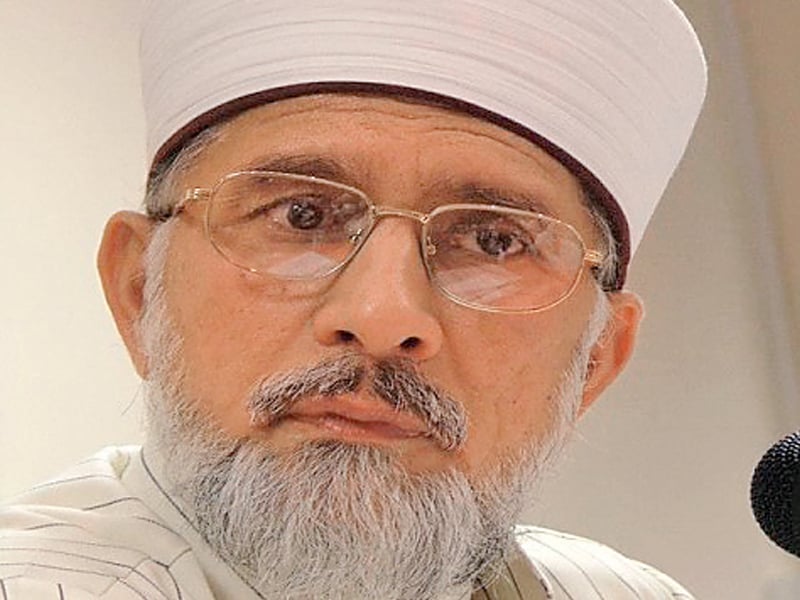
The Queen of England has perhaps not figured as prominently in the Supreme Court as she did on Monday when famous cleric Dr Tahirul Qadri’s ability to file a petition in Pakistan was questioned as a Canadian national.
On Monday, the Minhajul Quran International chief came under judicial scrutiny himself when he appeared before the court to argue, through a petition, that the Election Commission of Pakistan (ECP) should be reconstituted.
Questioning his status as a Canadian, the Supreme Court asked Qadri to explain the legitimacy of his petition and directed him to submit the documents on his dual nationality and his claims of being a stakeholder in the country’s democratic system after having sworn allegiance to another country.
Qadri had argued in his petition that the mandatory hearing before the chief election commissioner and other members of the ECP were appointed was not held and thus the commission should be reconstituted.
Chief Justice Iftikhar Muhammad Chaudhry, heading a three-judge bench, questioned Qadri about his Canadian nationality and asked: how could a person file a petition and criticise functions of Parliament if he could not enter it himself because of his dual nationality?
The court cited Interior Minister Rehman Malik’s case as precedent in which dual nationality holders were declared ineligible from entering Parliament. However, Qadri said that his case was different.
The chief justice also asked Qadri to read out his Canadian citizenship oath, but Qadri said that he had not brought a copy to the court and needed some time, insisting that Pakistani law did allow dual nationals to file petitions.

In response, the chief justice himself read out the oath and said if he (the chief justice) had sworn allegiance to Queen Elizabeth, he would not sit in the Supreme Court, as he would have no moral ground to question the country’s institutions after swearing allegiance to another country.
At the outset of the hearing, Qadri, who got the opportunity to address the court after waiting for hours, told the judges that since it was his first appearance before “this august” court, he wanted to express his feelings about “your great struggle for independence.”
Interrupting him immediately, the chief justice stopped him from glorifying the court and directed him to come straight to his case and convince the bench why it should hear Qadri’s petition.
Without allowing Qadri to proceed with his argument on the maintainability of the petition against the ECP, the court turned its attention on Qadri’s ‘locus standi’ — a Latin term that means legal standing before the court.
Qadri, who recently held a long march and sit-in along with thousands of followers outside the Parliament House demanding the overhaul of the democratic system, replied simply: “I am a Pakistani citizen.”
The chief justice asked, “Are you only a Pakistani citizen?”
Qadri replied, “Canadian too.”
“But Pakistan’s laws do not bar me from retaining citizenship in Canada, as currently a large number of Pakistanis are dual nationality holders,” Qadri said, adding, “I approached the court as a voter not as a parliamentarian.”
When Justice Chaudhry asked Qadri whether he had pledged allegiance to the Queen, Qadri refrained from replying to the question.
“How you can address us now?” asked an irked chief justice.
“You should ask this question from Pakistan’s law,” Qadir replied.
The chief justice said, “We are asking this from the attorney general.”
However, Attorney General Irfan Qadir did not give a clear response and maintained that dual nationals could not file petitions in the Supreme Court unless the court revisits one of its judgments on this subject (judgment in the PCO judges’ case). Qadri argued that according to Sub-Section 3 of Article 14, Pakistani citizens were allowed to hold nationality of other countries, including the UK and its colonies and Commonwealth countries.
“But there is a notification which names the countries whose citizenship can be taken up by Pakistani citizens,” he said.
Qadri will present this notification and other supporting documents in court today.
Published in The Express Tribune, February 12th, 2013.
COMMENTS (8)
Comments are moderated and generally will be posted if they are on-topic and not abusive.
For more information, please see our Comments FAQ




1730464033-0/BeFunky-collage-(12)1730464033-0-165x106.webp)
1732449527-0/Express-Tribune-(4)1732449527-0-270x192.webp)
1732441230-0/BeFunk_§_]__-(49)1732441230-0.jpg)


1732436825-0/BeFunk_§_]__-(47)1732436825-0.jpg)







Chief InJustice
Disenfranchising the elected politicians of their seats in the legislature due to their dual nationality was fair and just. Using the same argument how could Qadri challenge the authority of ECP? Even though the current SC is no friend of the govt but it cannot be so blatant to have two standards for two different parties. The irony is Qadri thinks that he is also a Canadian citizen but now he would lose that due to his perjury when applying for political asylum. He would also be prosecuted for collecting Canadian social welfare benefits while spending millions on his political campaign. He would also lose his tax free status as charitable organization. He would not go back to Canada to avoid jail time.
CJ himself challenging the law of the land. I can't believe CJ is ganging up against TQ so such a petty issue.
Being voter keeping up foreign citizenship and sworn on the allegiance for that country at any cost, Mr. Qadri can file petition before any court of law to secure his own personal interest, property and probability, if he has any apprehension of uncertainty, in Pakistan. He is a scholar, particularly of the religions, can guide and advice the parliamentarians and government and not file the petition challenging the functions of parliament. This is my question from Mr. Tahir-ul-Qadri, "did he cast vote in the general elections-2008 of Pakistan by either way?"
I had heard about CJ insulting people!
Self esteem and dignity is important for any individual that must be upheld.
Clearly CJ is upset that Qadri has been taking the limelight during the last few days which was exclusively the CJ's domain. Now this Qadri will have to take the brunt of it. This CJ has clearly not taken a similar stance with regard to the Dual nationality of the Courts itself knowing fully well that he will quickly loose the support of his fraternity many of whom must be holding dual nationalities. Also, this CJ has quietly buried Arsalan's case with a lot of shrewd.
If that was the case then why did SC hearing (and so quickly) Dr Qadri's petition ? I think election commission is in big trouble !
This is so stupid. Yes, he is a dual citizen, which makes him one half Pakistani. Can't he approach the apex court as Pakistani who is allowed to vote by the constitution?